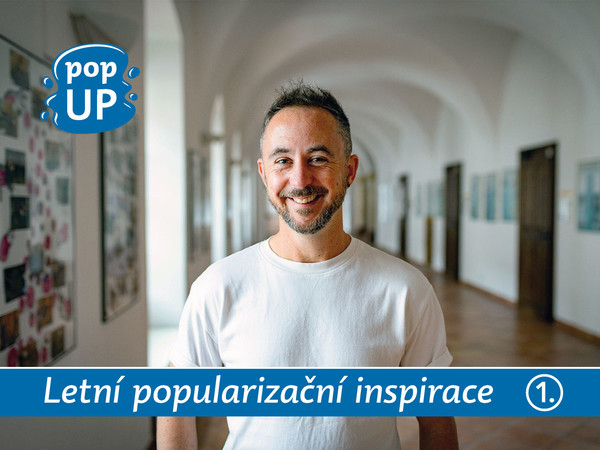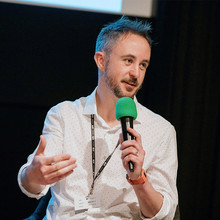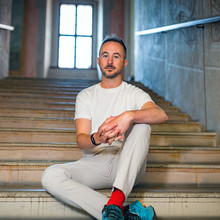For four years, Rob Key has been creating short documentaries about science and research at one of the world’s most renowned institutions – the University of Oxford. What is it like to work with scientists? Why do we need more room for curiosity? And how can we bring research closer to the general public? Rob Key visited this year’s AFO, where we talked about science communication. The published interview is the first of articles in the Summer Popularization Inspirations series.
You have been responsible for popularizing videos at Oxford University. How did you get this job? It sounds like a dream job to me!
Well, that is interesting, because although, broadly I work in science communication, I don't have a background in science; I studied philosophy and then psychoanalysis. After that, I got involved in documentary production in London. I did a course in documentary film directing and then got involved in the world of commercial production there. But I always maintained a side interest in making short documentaries.
Four years ago, this job at Oxford came up, and it sounded amazing, so I applied. There was quite interesting novel interview process where you had to edit a short documentary based on material they provided. Supposedly, they liked my work because I made a video that was ‘funny’ and entertaining. So that is how I ended up at Oxford.
What type of films are you trying to make? Is it the humour you mentioned that you try to implement in your videos?
Where possible, yes. Actually, it is quite hard to elicit humour in the documentary genre in the right way. It is much simpler to pick a neutral or gloomy mood, but much harder to make something fun and humorous while also communicative.
I think having nice visuals, following people, and making them the centre of the filmmaking process helps. I always aim to write the documentary so that it has some kind of interesting story element – some broader context of meaning that gives it a frame. If humour helps the story, then great. If not, then it’s fine without.
You make films for a platform named Oxford Sparks. What is it?
Oxford Sparks is a branch of the University of Oxford responsible for producing broadly science-related communication. We create short documentaries, podcasts, and short videos as well. There is also a website with additional content. I am responsible for documentaries, so I do the writing, directing, filming, and editing and I cooperate with the producer, who is responsible for much organization, as well as scripting the podcasts and short videos. We are producing about six short documentaries a year.
Oxford Sparks has been around since 2011. Previously, they produced a lot of animated videos, which at that time was the cool thing. When I came in, their research suggested that people relate better to other people, and that we should be producing live-action content and telling stories by following other’s journeys.
Are there any specifics about working for a university compared to the BBC, UNICEF, or the commercial sector, where you have also worked?
The most important think about Oxford Sparks – and distinct from other fields I worked for – is the creative freedom we’re allow to play with. The way it works at Sparks, is that Oxford researchers pitch ideas to our team, and then we select several of them and start discussions and development.
Another key difference is the responsibility we feel we have to the public. Because Oxford has such a reputation, it’s important to demonstrate its values and communicate what it does to the public – because a lot of money for the research comes from them. I think universities can have bigger societal impact and create a space for discussion if they communicate authentically.
It seems that researchers at Oxford are keen in science communication, when they come to you with their own topics…
Yes. It is a lucky position to be in. You have all these amazing professors and researchers coming to you saying, “Hey, do you want to make a film about this?” And we’re like, “Yeah, that sounds great – let’s do it.”
There’s an idea that scientists don’t want to communicate their research with the public, but in my experience, people genuinely want to share their knowledge and ideas. Science is inherently social. Of course, there are those who don’t have the same level of passion for outreach, but I feel fortunate to have worked with some of the best communicators.
It is a real privilege of the job to get to know a specific area of research very well over the course of a few months. It is gradually improving my pub quiz knowledge as well!
What is the work with scientists like, does it have some specifics?
We’ll often come up with ideas how to clarify some scientific topic by using creative analogies or demonstrations. We then pitch them to the researchers, and hope they agree to go along with us. Usually, they do, which is nice.
For example, when working with the Brain Network Dynamics Unit, in order to creatively demonstrate how waves in the brain can form harmony and disharmony, we decided to collaborate with a choir, filming inside one of the college chapels. The film was called ‘The Symphony of the Brain’, and one of the neuroscientists was ‘conducting’ the choir. During filming, to illustrate how neural disharmony might ‘sound’, I suggested that two halves of the choir should sing out of tune with one another. But the researchers said, “Actually, what makes more sense is if they sing slightly out of time, rather than out of tune.” So, we demarcated two choirs (and two conductors with many years’ experience), and we asked them to start in time and then slowly drift out of time. It was so odd to the ears. And the conductors and singers both said, “We’ve never done that before!” It was quite challenging, but they really enjoyed it, and it helped the film.
Is there a scientific topic that has been the biggest challenge for you to film so far?
We did a film that was challenging because of the general lack of visuals that accompanies the type of research. Broadly, this was about demography, that’s the study of populations, and it’s a fascinating subject area that generates impactful outcomes, and which helps us understand who we are as societies. Most of the time, though, researchers sit behind the desk and work on computer. It was hard to come up with a visual idea. In the end, we focused on one researcher whose motivation for studying demography was personal. He’s Mexican, and he wanted to show how the death rate in Mexico changed during a certain period of political unrest. So, rather than searching for visuals, the film centred on that human story as a way into demography, which is otherwise quite abstract.
More space for curiosity
What type of audience are you targeting with your films?
At Oxford, we target a demographic called “curious spectators.” This is based on research done before I started at Oxford that looked at peoples' relationship to science and their online science information behaviours. Curious spectators are broadly adults aged 30+, mainly women, who don’t necessarily have a specific interest in science but will engage if they see something that relates to them.
For example, we made a film about a new cancer treatment, telling the story of someone undergoing it. The comments showed that people were genuinely interested, not just in the science but in the treatment as an option. So there is a way to spark that initial curiosity that can lead them to learn more – or, in the case of the cancer video, become aware of a treatment that could one day help them.
Do you feel there’s increasing interest in science among the public?
It’s really hard to say. It depends on what’s happening in the world. Sometimes people are not focused on science because they are preoccupied with other things going on.
I think it’s important to create a playing field between scientists and the public, and to build trust. The time when experts could just speak facts without explanation has passed. People want to know they can trust the research, and part of that is showing how it’s done, showing the process.
One of our goals in the videos and podcasts is to show the ‘life of the researcher’ – what it’s like to be one – and how they arrive at their results. I think that humanizes the process and helps build trust that what they’re doing is valid and truthful. Which is tricky, because we live in a kind of post-truth age. We try to say, “There is research you can trust and learn from. Here are the people behind it.”
This year you came to AFO with Wandering in the Woods. What is it about?
Richard White, the researcher who is focusing on cancer treatment and the main character in the film, says that we have to allow researchers creative freedom and the space to wander.
We are trying to show, that science doesn’t always work the way we plan, our hypothesis at the beginning can be wrong. There’s a lot of experimentation, creativity, randomness, and chance that you can’t control. If we try to predict and control everything, we’re cutting off a part of science that’s actually productive in the long term. Some important discoveries are just combinations of many smaller findings over 100 or 200 years. And when people were doing their research back then, they didn’t know it would one day become relevant.
I think it’s important that people like Richard and his lab exist – to create that space for curiosity and wandering. Because it can end up with unexpected discoveries.
You have received many prizes for your films. Which one do you hold dearest?
I really enjoyed last year at AFO59, where there was a special screening of three Oxford Sparks films. For someone who usually makes content for online and who doesn’t get to gauge audience reactions, it was a wonderful and affirming experience. It wasn’t an award per se, but it was a nice reward. Showcasing a variety of the films we are making, interacting with the audience, it is what film festivals are all about.
Off the back of these experiences, I am now part of a team who are starting the very first University of Oxford Film Festival, launching in 2026, which is super exciting.
Rob Key is Research Producer and Filmmaker responsible for producing live-action content at the University of Oxford. A former scholar of philosophy and psychoanalysis, Rob undertook his film training with the DocNomads International Masters course and at the National Film and Television School, UK. He has a passion for delivering engaging story-driven content that touches both hearts and minds, previously working with diverse organisations around the globe. He is writer, director, and filmmaker and specialises in creating factual short form content.


